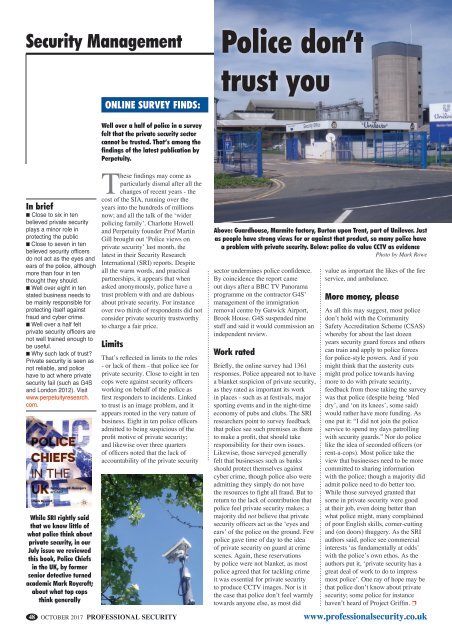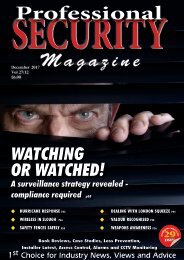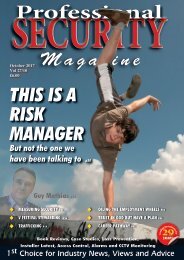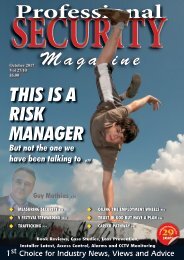27-10final
Create successful ePaper yourself
Turn your PDF publications into a flip-book with our unique Google optimized e-Paper software.
Security Management<br />
Police don’t<br />
trust you<br />
online survey finds:<br />
Well over a half of police in a survey<br />
felt that the private security sector<br />
cannot be trusted. That’s among the<br />
findings of the latest publication by<br />
Perpetuity.<br />
In brief<br />
n Close to six in ten<br />
believed private security<br />
plays a minor role in<br />
protecting the public<br />
n Close to seven in ten<br />
believed security officers<br />
do not act as the eyes and<br />
ears of the police, although<br />
more than four in ten<br />
thought they should.<br />
n Well over eight in ten<br />
stated business needs to<br />
be mainly responsible for<br />
protecting itself against<br />
fraud and cyber crime.<br />
n Well over a half felt<br />
private security officers are<br />
not well trained enough to<br />
be useful.<br />
n Why such lack of trust?<br />
Private security is seen as<br />
not reliable, and police<br />
have to act where private<br />
security fail (such as G4S<br />
and London 2012). Visit<br />
www.perpetuityresearch.<br />
com.<br />
While SRI rightly said<br />
that we know little of<br />
what police think about<br />
private security, in our<br />
July issue we reviewed<br />
this book, Police Chiefs<br />
in the UK, by former<br />
senior detective turned<br />
academic Mark Roycroft;<br />
about what top cops<br />
think generally<br />
48<br />
These findings may come as<br />
particularly dismal after all the<br />
changes of recent years - the<br />
cost of the SIA, running over the<br />
years into the hundreds of millions<br />
now; and all the talk of the ‘wider<br />
policing family’. Charlotte Howell<br />
and Perpetuity founder Prof Martin<br />
Gill brought out ‘Police views on<br />
private security’ last month, the<br />
latest in their Security Research<br />
International (SRI) reports. Despite<br />
all the warm words, and practical<br />
partnerships, it appears that when<br />
asked anonymously, police have a<br />
trust problem with and are dubious<br />
about private security. For instance<br />
over two thirds of respondents did not<br />
consider private security trustworthy<br />
to charge a fair price.<br />
Limits<br />
That’s reflected in limits to the roles<br />
- or lack of them - that police see for<br />
private security. Close to eight in ten<br />
cops were against security officers<br />
working on behalf of the police as<br />
first responders to incidents. Linked<br />
to trust is an image problem, and it<br />
appears rooted in the very nature of<br />
business. Eight in ten police officers<br />
admitted to being suspicious of the<br />
profit motive of private security;<br />
and likewise over three quarters<br />
of officers noted that the lack of<br />
accountability of the private security<br />
OCTOBER 2017 PROFESSIONAL SECURITY<br />
Above: Guardhouse, Marmite factory, Burton upon Trent, part of Unilever. Just<br />
as people have strong views for or against that product, so many police have<br />
a problem with private security. Below: police do value CCTV as evidence<br />
Photo by Mark Rowe<br />
sector undermines police confidence.<br />
By coincidence the report came<br />
out days after a BBC TV Panorama<br />
programme on the contractor G4S’<br />
management of the immigration<br />
removal centre by Gatwick Airport,<br />
Brook House. G4S suspended nine<br />
staff and said it would commission an<br />
independent review.<br />
Work rated<br />
Briefly, the online survey had 1361<br />
responses. Police appeared not to have<br />
a blanket suspicion of private security,<br />
as they rated as important its work<br />
in places - such as at festivals, major<br />
sporting events and in the night-time<br />
economy of pubs and clubs. The SRI<br />
researchers point to survey feedback<br />
that police see such premises as there<br />
to make a profit, that should take<br />
responsibility for their own issues.<br />
Likewise, those surveyed generally<br />
felt that businesses such as banks<br />
should protect themselves against<br />
cyber crime, though police also were<br />
admitting they simply do not have<br />
the resources to fight all fraud. But to<br />
return to the lack of contribution that<br />
police feel private security makes; a<br />
majority did not believe that private<br />
security officers act as the ‘eyes and<br />
ears’ of the police on the ground. Few<br />
police gave time of day to the idea<br />
of private security on guard at crime<br />
scenes. Again, these reservations<br />
by police were not blanket, as most<br />
police agreed that for tackling crime<br />
it was essential for private security<br />
to produce CCTV images. Nor is it<br />
the case that police don’t feel warmly<br />
towards anyone else, as most did<br />
value as important the likes of the fire<br />
service, and ambulance.<br />
More money, please<br />
As all this may suggest, most police<br />
don’t hold with the Community<br />
Safety Accreditation Scheme (CSAS)<br />
whereby for about the last dozen<br />
years security guard forces and others<br />
can train and apply to police forces<br />
for police-style powers. And if you<br />
might think that the austerity cuts<br />
might prod police towards having<br />
more to do with private security,<br />
feedback from those taking the survey<br />
was that police (despite being ‘bled<br />
dry’, and ‘on its knees’, some said)<br />
would rather have more funding. As<br />
one put it: “I did not join the police<br />
service to spend my days patrolling<br />
with security guards.” Nor do police<br />
like the idea of seconded officers (or<br />
rent-a-cops). Most police take the<br />
view that businesses need to be more<br />
committed to sharing information<br />
with the police; though a majority did<br />
admit police need to do better too.<br />
While those surveyed granted that<br />
some in private security were good<br />
at their job, even doing better than<br />
what police might, many complained<br />
of poor English skills, corner-cutting<br />
and (on doors) thuggery. As the SRI<br />
authors said, police see commercial<br />
interests ‘as fundamentally at odds’<br />
with the police’s own ethos. As the<br />
authors put it, ‘private security has a<br />
great deal of work to do to impress<br />
most police’. One ray of hope may be<br />
that police don’t know about private<br />
security; some police for instance<br />
haven’t heard of Project Griffin. p<br />
www.professionalsecurity.co.uk










